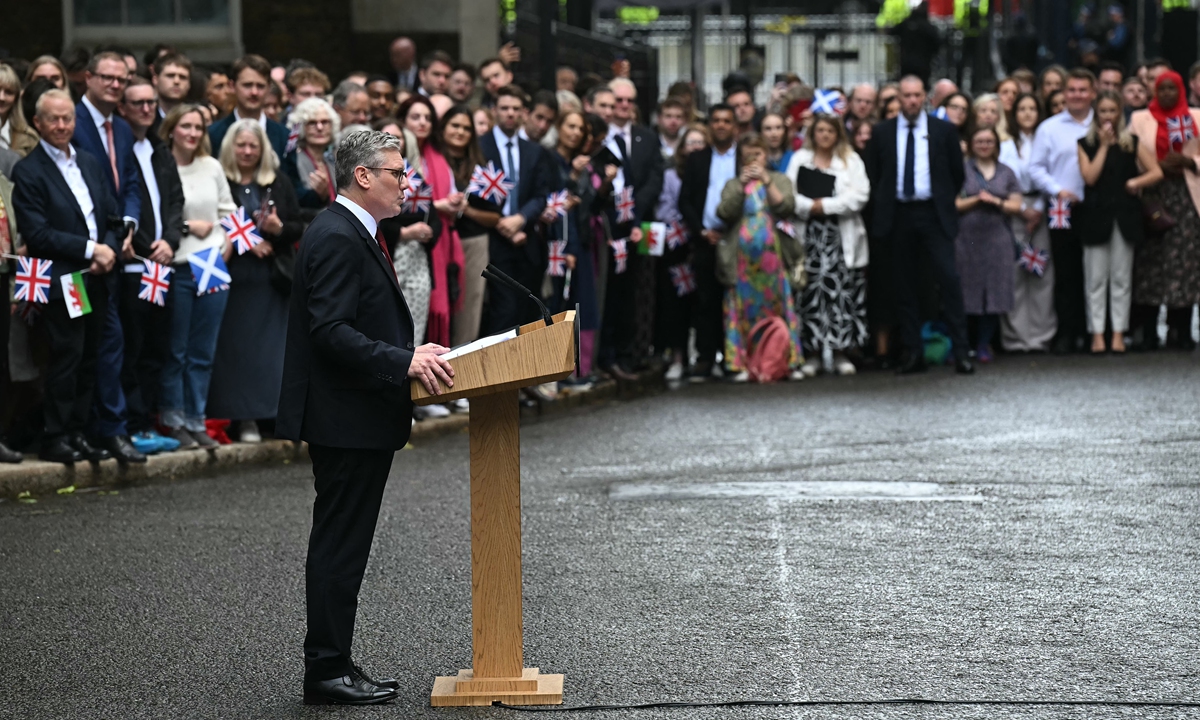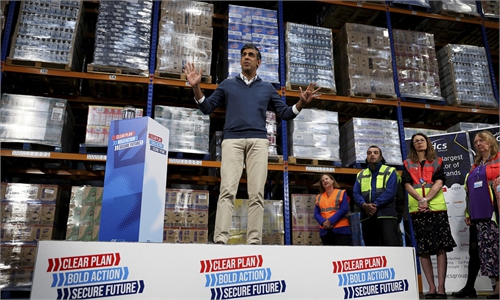Starmer replaces Sunak after Labour Party wins UK election, facing challenges to deliver changes
China hopes to work with UK to advance relations forward on right track: FM

Britain's new prime minister and leader of the Labour Party Keir Starmer addresses the nation after his general election victory, outside 10 Downing Street in London on July 5, 2024, a day after Britain held a general election. Starmer's center-left opposition Labour party swept to a landslide victory, ending 14 years of right-wing Conservative rule. Photo: AFP
Labour leader Keir Starmer has officially become the new prime minister of the UK after the center-left party won a landslide victory in the UK's general election on Friday, sweeping the Conservative Party out of power after a 14-year rule.
Chinese analysts viewed the victory of the Labour Party as the result of people's loss of trust in the Tories and a strong desire for changes, despite uncertainty about Labour's ability to deliver real changes. In terms of China-UK relations, analysts said the Labour cabinet can be expected to increase its engagement with China, but it remains to be seen whether it can bring sustained and substantive improvement to bilateral ties amid the current negative climate of the Western world's policies toward China.
Speaking outside 10 Downing Street after his party's landslide election win, Starmer pledged to restore trust in politics and "navigate away to calmer waters," BBC reported.
Starmer, who has formally replaced Tory leader Rishi Sunak after an audience with the King at Buckingham Palace, started to appoint his new cabinet on Friday afternoon, before it meets for the first time on Saturday. Rachel Reeves becomes the UK's first female chancellor, Angela Rayner is made deputy prime minister, Yvette Cooper becomes home secretary and David Lammy is the new foreign secretary.
Before that, Rishi Sunak formally tendered his resignation to the king on Friday morning local time. In a farewell speech outside No 10, Sunak apologized to unsuccessful Tory candidates and told the public: "I have heard your anger, your disappointment," BBC reported.
Change begins?
"Change begins now…. Today we start the next chapter - begin the work of change, the mission of national renewal and start to rebuild our country," Starmer told supporters at a triumphant rally earlier that day.
Li Guanjie, a research fellow with the Shanghai Academy of Global Governance and Area Studies under the Shanghai International Studies University, told the Global Times that although Labour's politics do have some left-wing characteristics, its victory is not necessarily the result of people's preference for a left-wing government, but mainly shows a strong desire for changes.
"Similar to the rise of right-wing politicians in Europe, Labour's victory was largely a result of the British public who feels that they were getting worse off," Li said, "Since the ruling party has failed to improve the economy and people's livelihood for so many years, why not give the opposition party a chance?"
Since the Conservatives entered office 14 years ago, the UK's economy has struggled, with GDP per capita growing just 4.3 percent from 2007 to 2023, compared with 46 percent growth over the previous 16 years, according to research released by the Resolution Foundation think tank, Aljazeera reported.
Since the COVID-19 pandemic, Britain's economy has been the second weakest in the G7, Reuters reported. During Sunak's tenure, Britain's first Indian-origin prime minister, India has surpassed the UK as the fifth largest economy. The UK is also lacking financial support when health, house-building and other services are under pressure, according to media reports.
Echoing Li, Cui Hongjian, a professor at Beijing Foreign Studies University's Academy of Regional and Global Governance, said the election results show that the British public has lost confidence in the Conservatives.
"The Tories have not solved the problems of Brexit well… And the intensifying internal struggles and scandals have made the British public wonder whether Tories are in power for the interests of the British people and the country, or for the interests of the party and politicians," Cui said.
But experts also noted that because of the many structural problems facing Britain, it will be still difficult for the Labour Party to meet most of the demands of British people and achieve "real changes."
"The British people will be disappointed if they expect too much from Labour, because the government will always encounter lots of obstacles in reality, such as the 'proper windfall tax' on oil and gas companies Labour pledged before the election," Li said.
"Healthcare, education, immigration, and so on, are long-term jobs… Perhaps in another year's time, the stark gap between Labour's 'change' rhetoric and reality will become clearer," Li said.
The result of the US elections will bring some complicated changes to the US-UK relationship, Cui said, "given the US' own domestic turmoil and the shifting focus of its foreign policy, the 'special relationship' will inevitably be reset."
Start of re-engagement?
In response to the UK's election result, Mao Ning, spokesperson of the Chinese Foreign Ministry, said that China hopes to work with the UK to advance China-UK relations on the right track on the basis of mutual respect and win-win cooperation.
"China and the UK are both permanent members of the UN Security Council and major economies in the world. Growing stable and mutually beneficial bilateral ties between China and the UK serves the fundamental interests of both peoples, helps both countries to better respond to global challenges together, and contributes to world peace and development," Mao said at a daily press briefing on Friday.
Before the election, David Lammy said on Monday that Britain must consistently approach and engage with a country as important as China if Labour is elected. He said Labour would begin an audit of UK-China relations and seek more engagement with China at all levels of government, given the current government's lack of engagement with Chinese officials, according to Xinhua.
Over the past few years, high-level contacts between China and the UK have been sparse and relations remain frosty. In August 2023, Britain's then foreign secretary James Cleverly paid an official visit to China.
Whether it is an emphasis on proactive changes or a critique of Conservative policies, Labour is likely to put more emphasis on China-UK relations, whether symbolic or practical, Li said, "Given more European leaders have paid visits to China, it cannot be ruled out that Starmer will visit China as well after taking office."
Despite positive signals and changes, analysts said it still remains to be seen how China-UK relations develop under the new British government.
Earlier this year, Lammy said China poses "real security threats," and said Labour will pursue legal routes toward declaring a "crackdown" on Uygur Muslims as a "genocide" if it wins the election, media reported.
"No matter which party is in power, the UK has a basic set of ideas on Europe, the US and China… Labour is unlikely to make a radical change over the existing route," Li said.
Labour's position on some China-related issues remains relatively hawkish, and cited certain Chinese internal affairs as major concerns to itself, Cui said, "If Labour really wants to reverse the decline in frosty relations between China and Britain under the Conservatives, it needs to change some political prejudices, and it also needs more courage amid a negative climate of the Western policies toward China."
China welcomes engagement with the UK, but it needs to be meaningful, Cui said.
If Labour's cabinet members continue to send negative public opinion signals after visiting China, yield to pressure from the Parliament as the Tories did, and still emphasize "politics and security" in the face of the demands of the British business community to develop relations with China, then it will be difficult to bring about a sustained improvement in China-UK relations.


